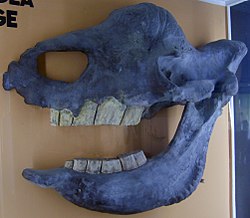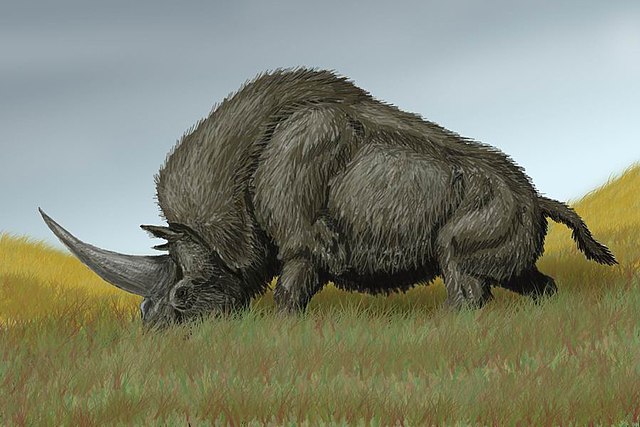Elasmotherium
genus of mammals (fossil) From Wikipedia, the free encyclopedia
Elasmotherium is an extinct giant rhinoceros.
| Elasmotherium Temporal range: late Pliocene to late Pleistocene, 2.6 mya – ~50 kya | |
|---|---|
 | |
| Elasmotherium skull | |
| Scientific classification | |
| Kingdom: | |
| Class: | |
| Order: | |
| Family: | |
| Genus: | Elasmotherium J. Fischer, 1808 |

It lived from 2.6 million years ago (mya) to about 50,000 years ago. Fossils have been found in Europe and Asia.[1] This giant lived and grazed on the Eurasian steppes (grasslands).
Description
Elasmotherium was a heavily-built quadruped that walked on four hoofed legs. Its legs were longer than those of other rhinos and were adapted for galloping, giving it a horse-like gait.
It probably had a large horn on its forehead, but fossils of the horn have not been found. The teeth were tall-crowned and were covered with cement and wrinkled enamel. Its mouth at the front was a beak; there are no teeth in front of the molars.
Morphology
The specimens of E. sibiricum are up to 4.5 m (15 ft) in body length with shoulder heights over 2 m (6 ft 7 in). E. caucasicum was at least 5 m (16 ft) in body length with an estimated mass of 3.6–4.5 tonnes (4–5 short tons). This is based on isolated molars which are larger than those of the Siberian species.[2]
Both species were among the largest in the family Rhinocerotidae, comparable in size to the woolly mammoth and larger than the woolly rhinoceros.[3][4] The feet were unguligrade,[5] the front larger than the rear, with 4 digits at the front and 3 at the rear.[6]
References
Wikiwand - on
Seamless Wikipedia browsing. On steroids.
